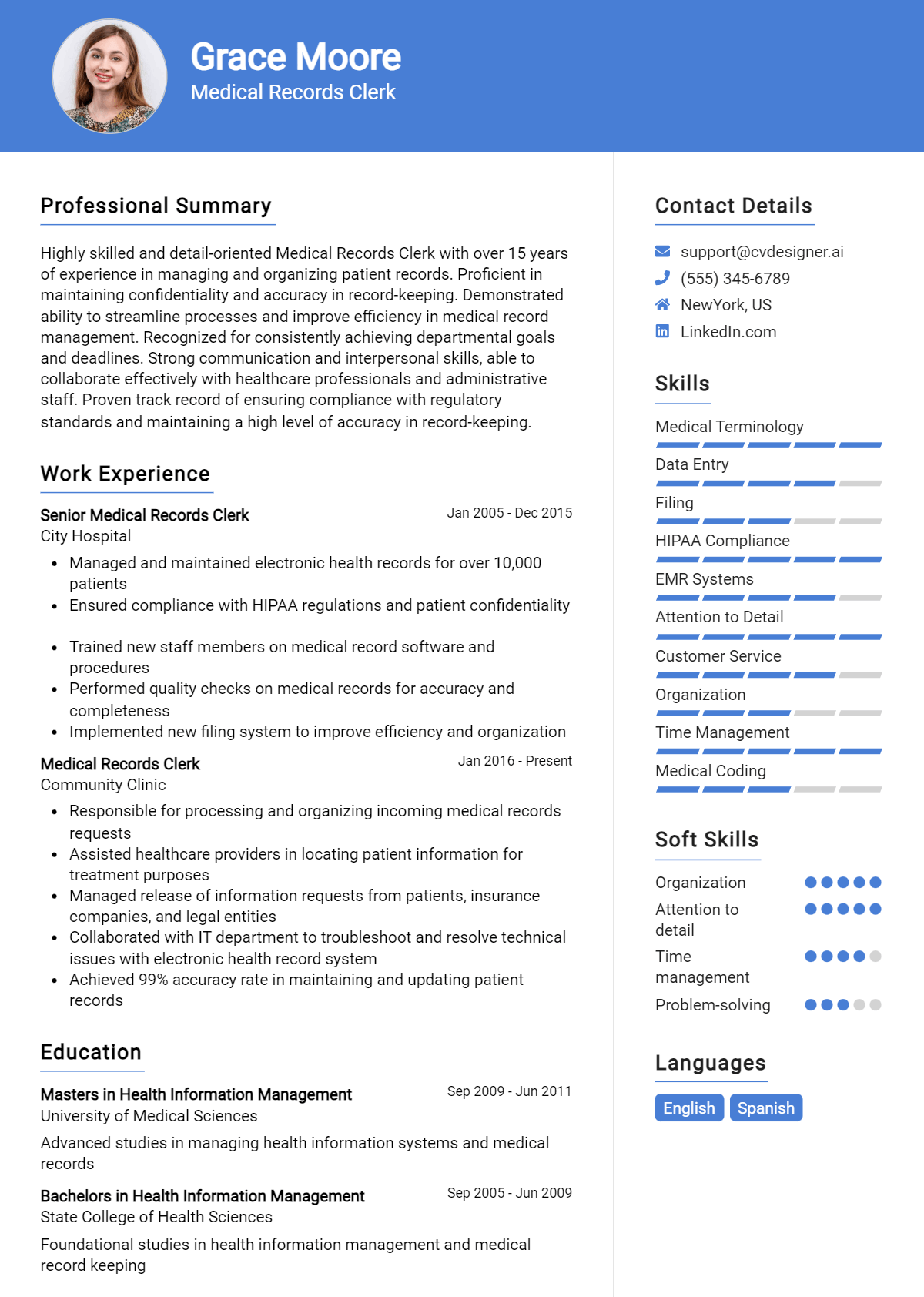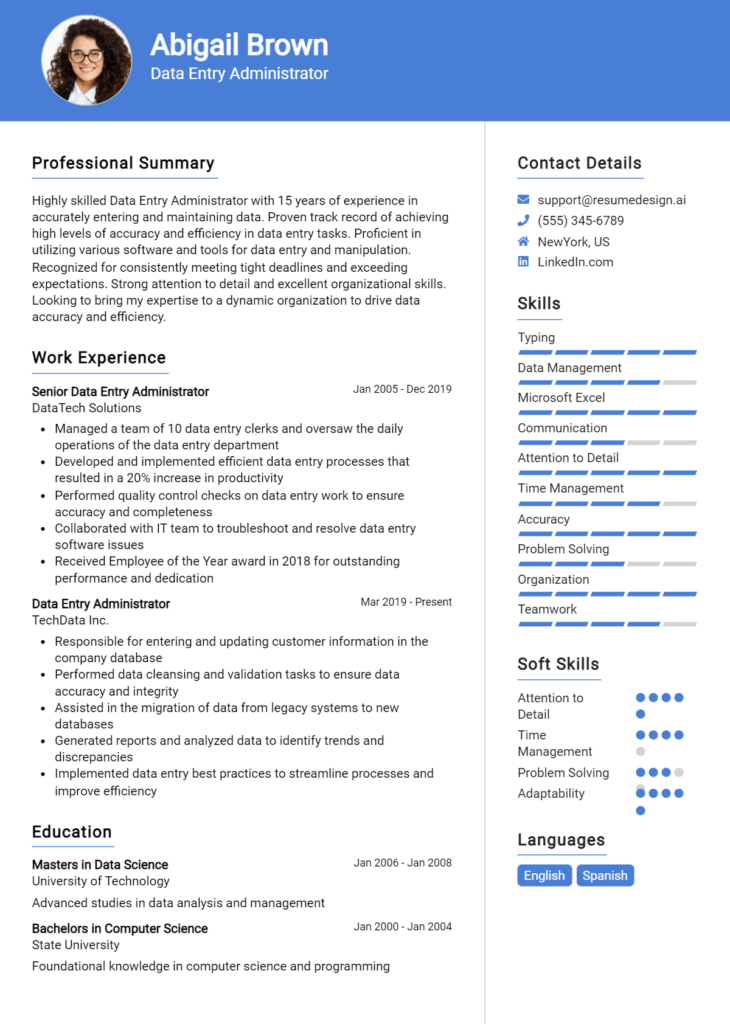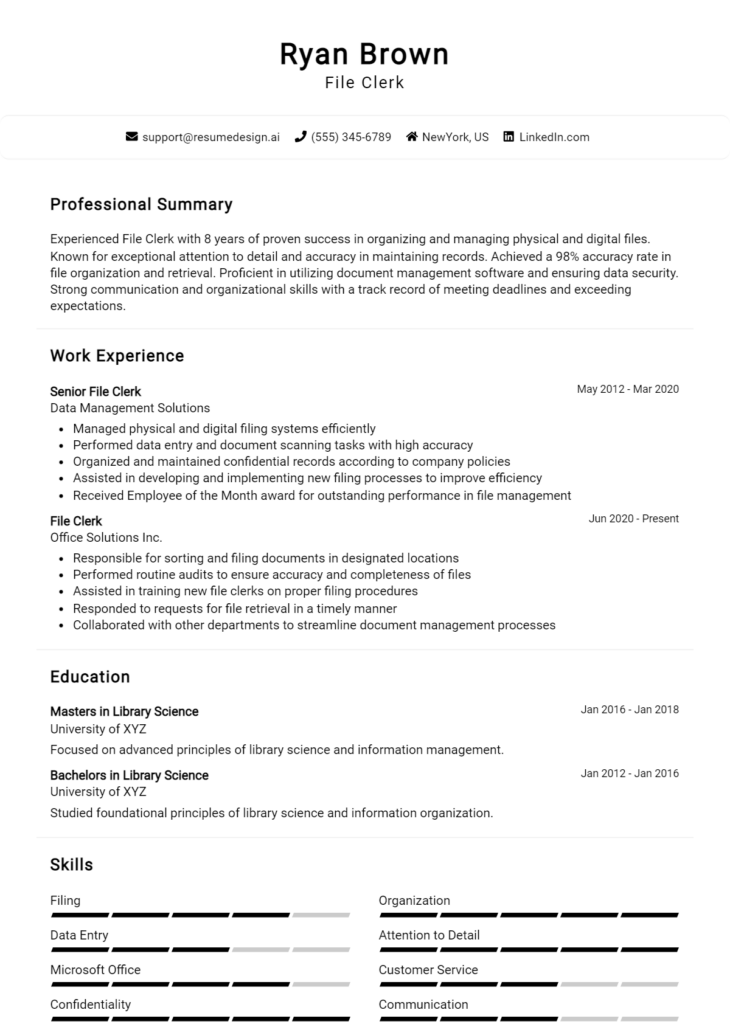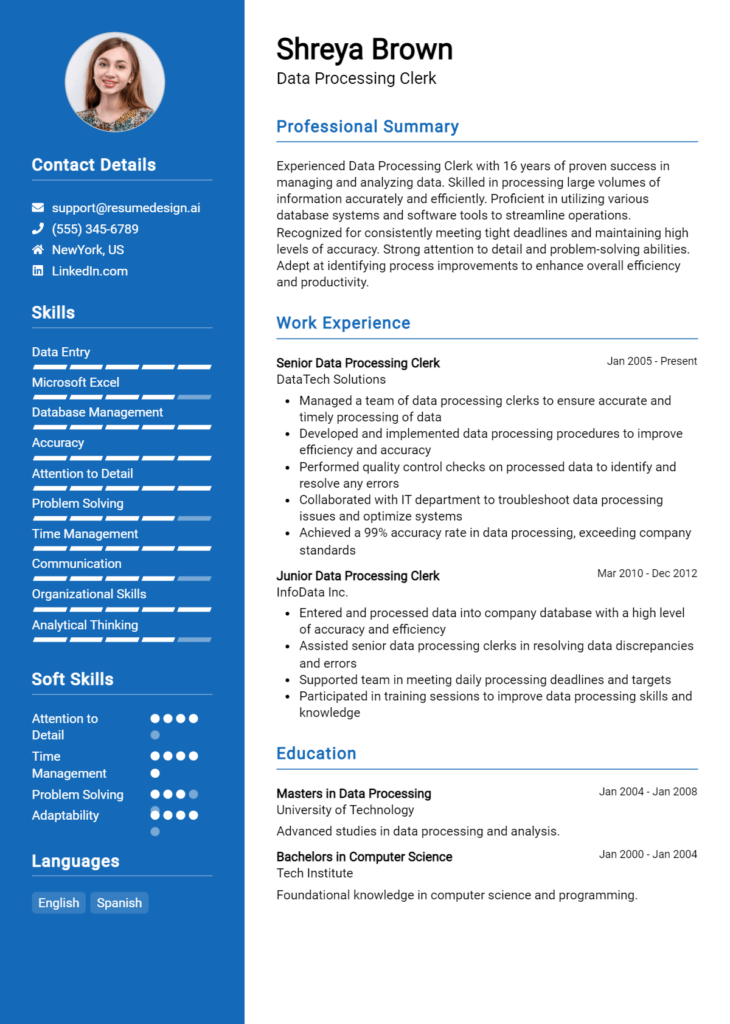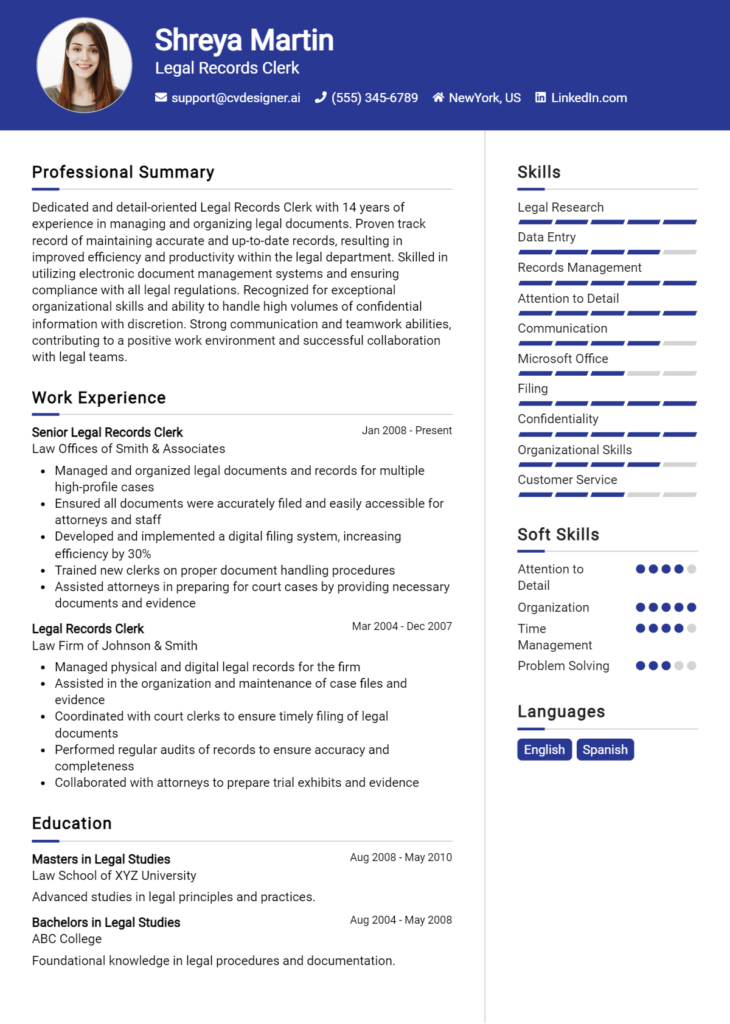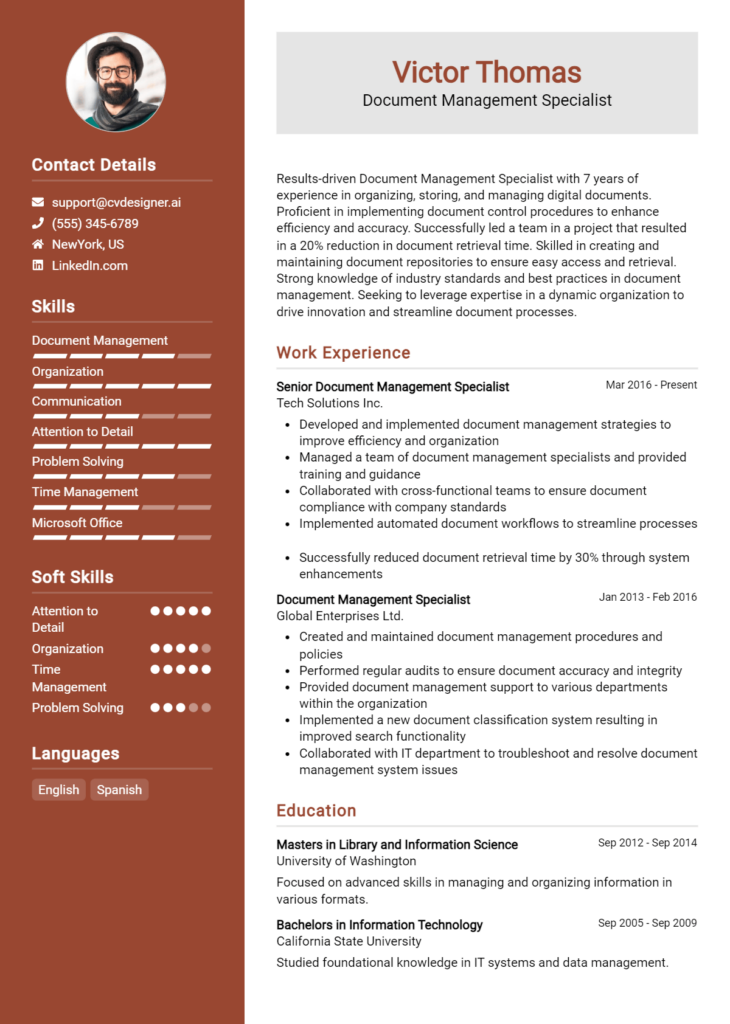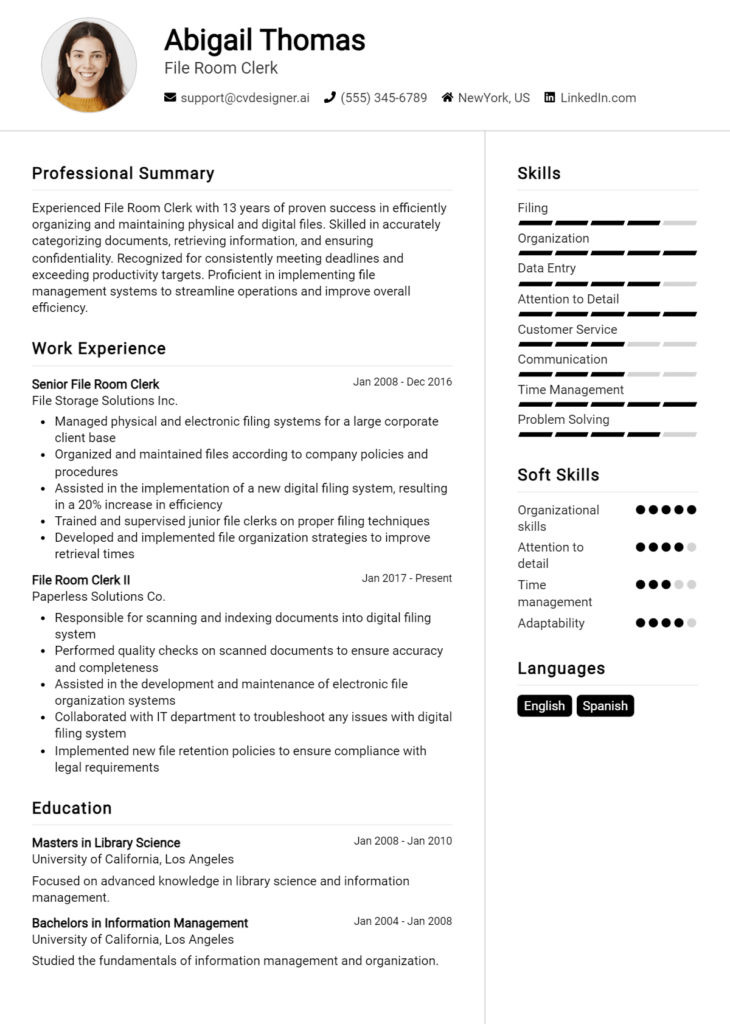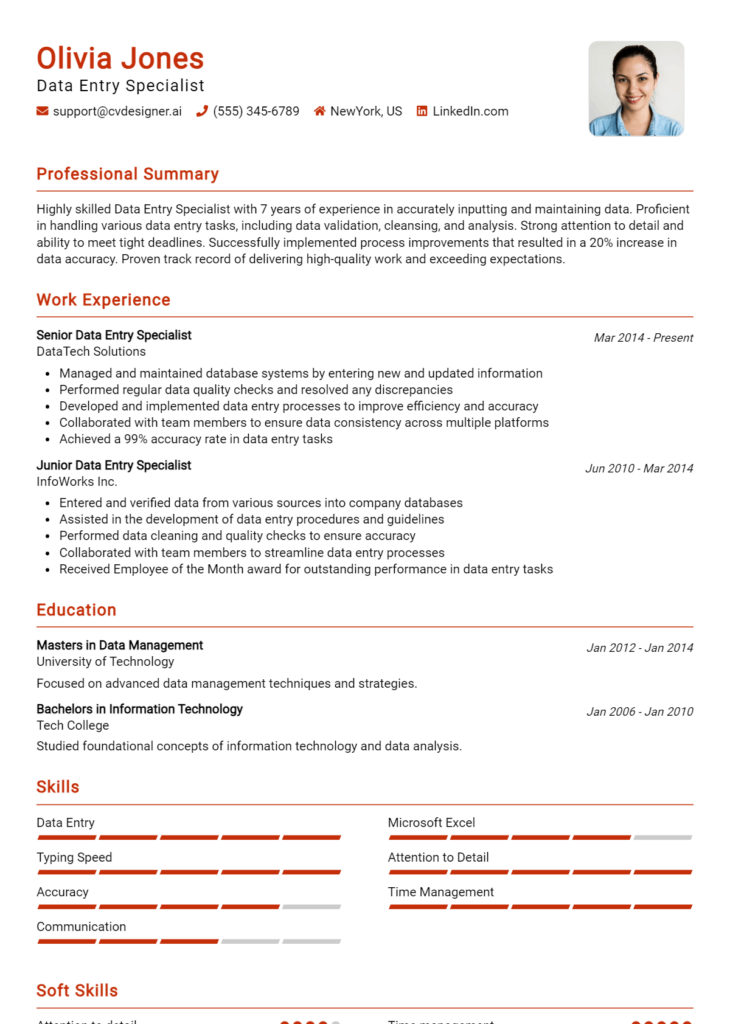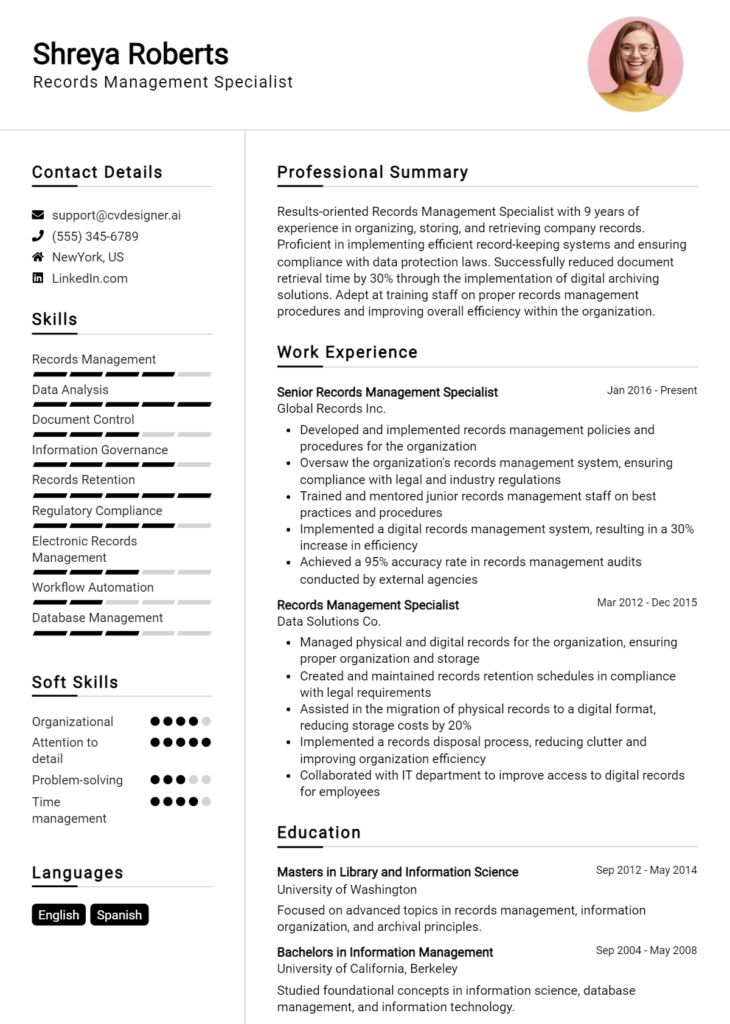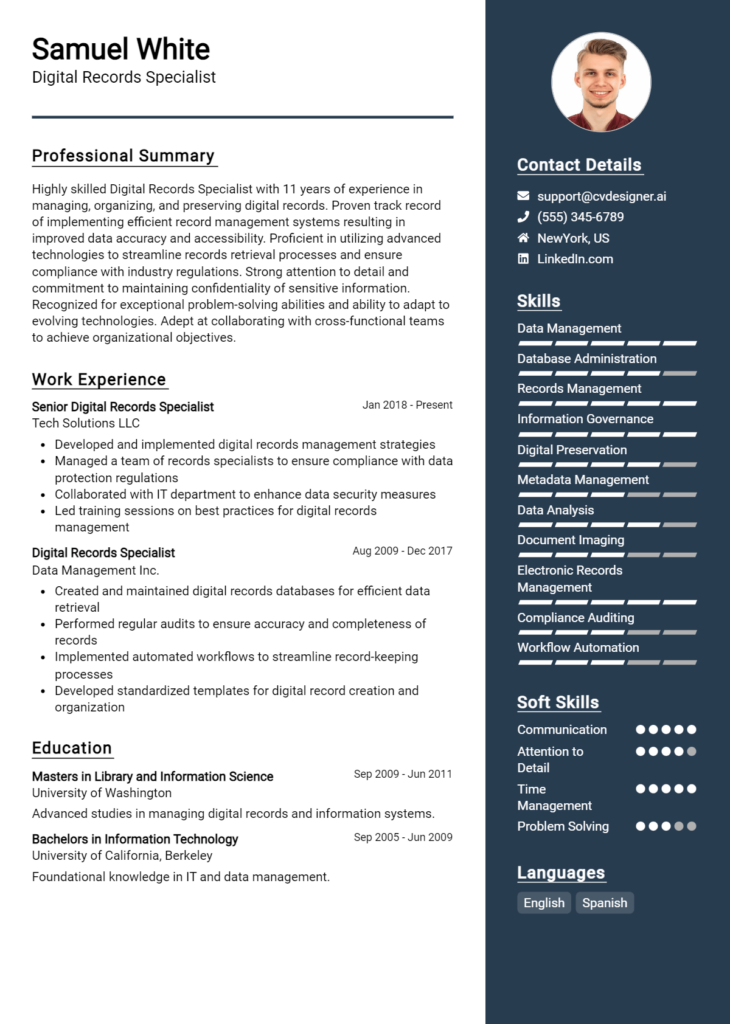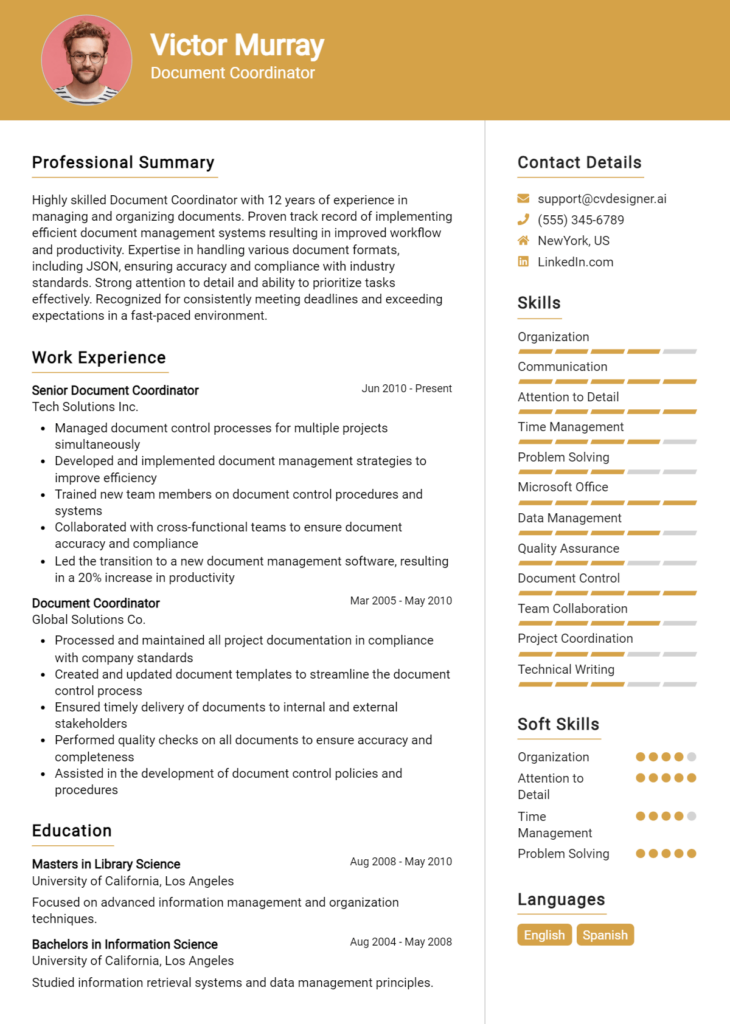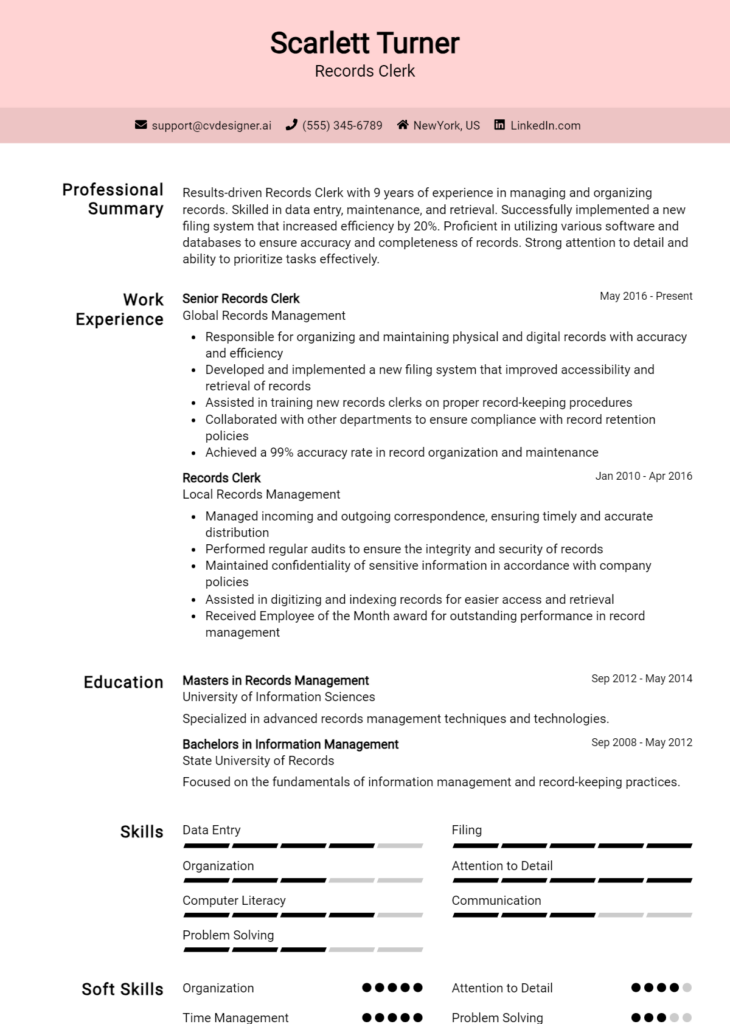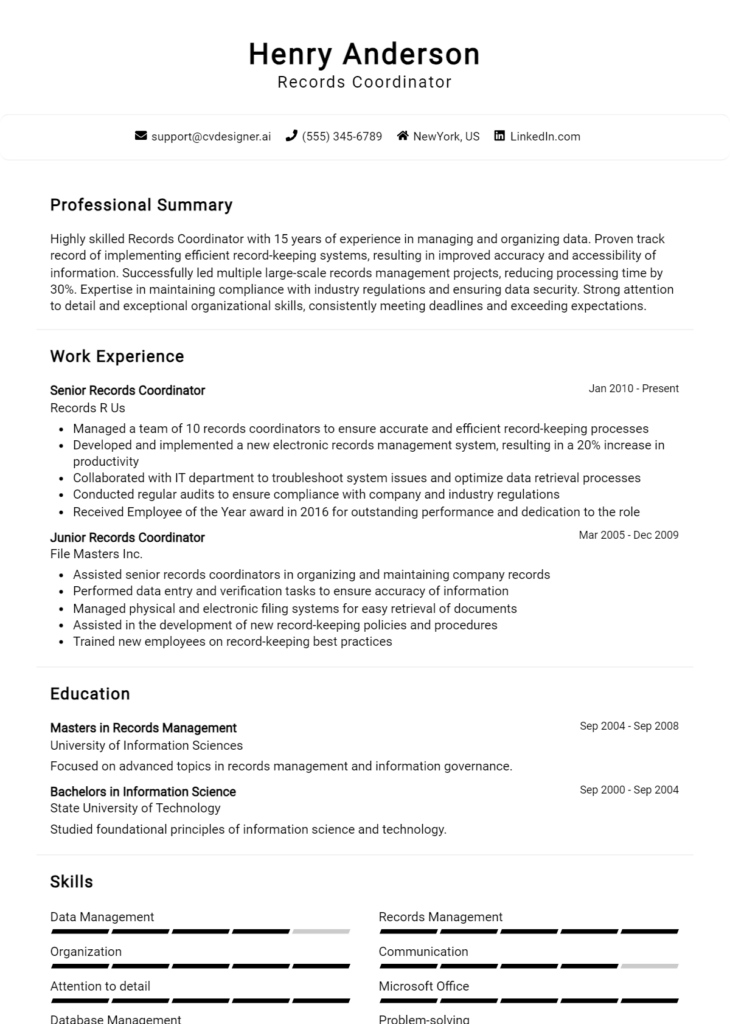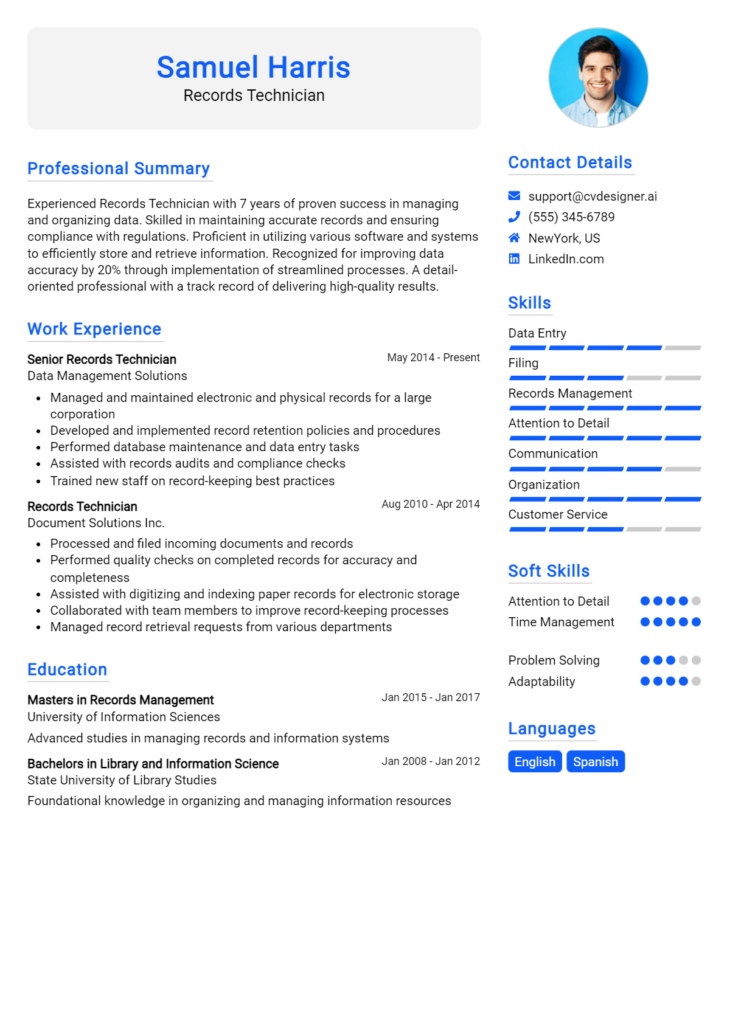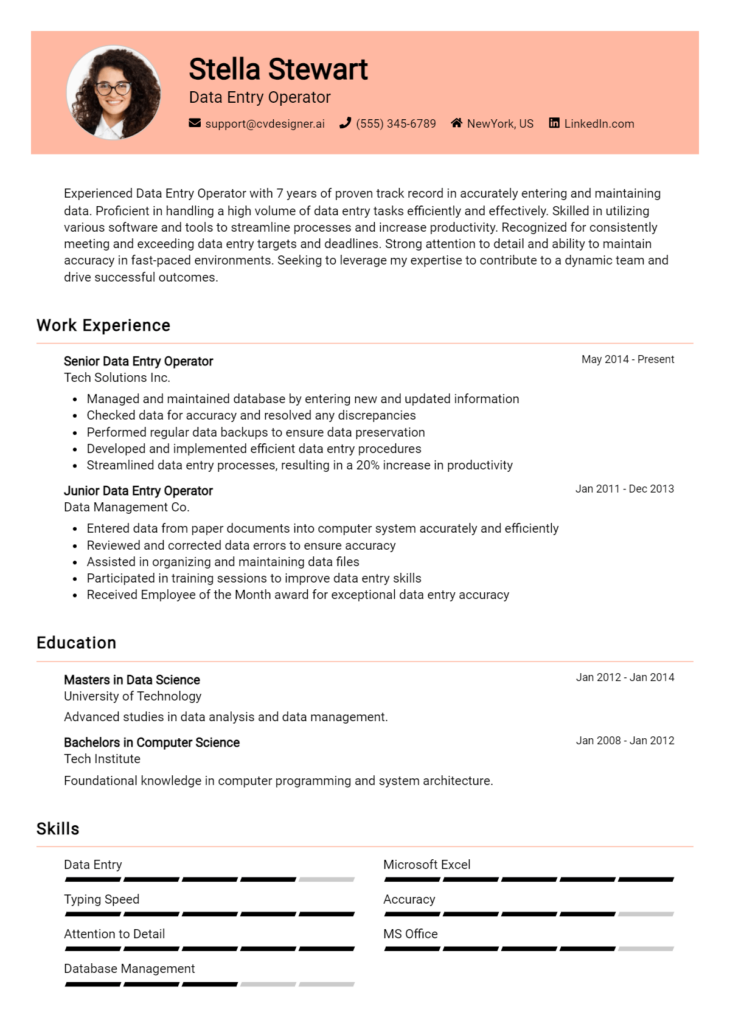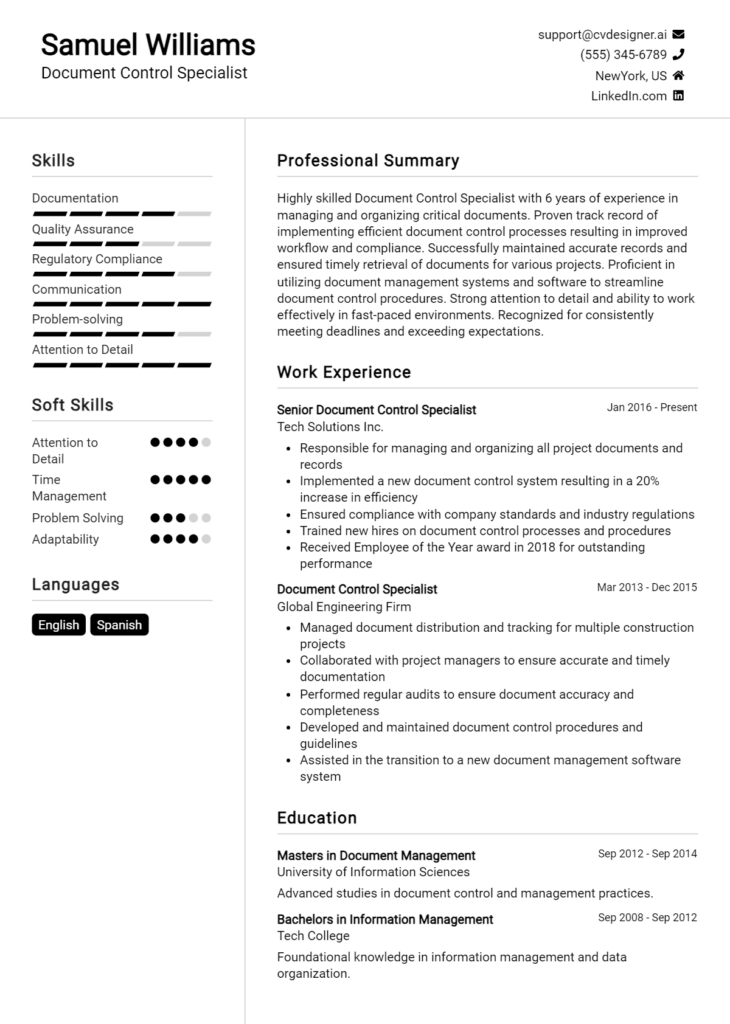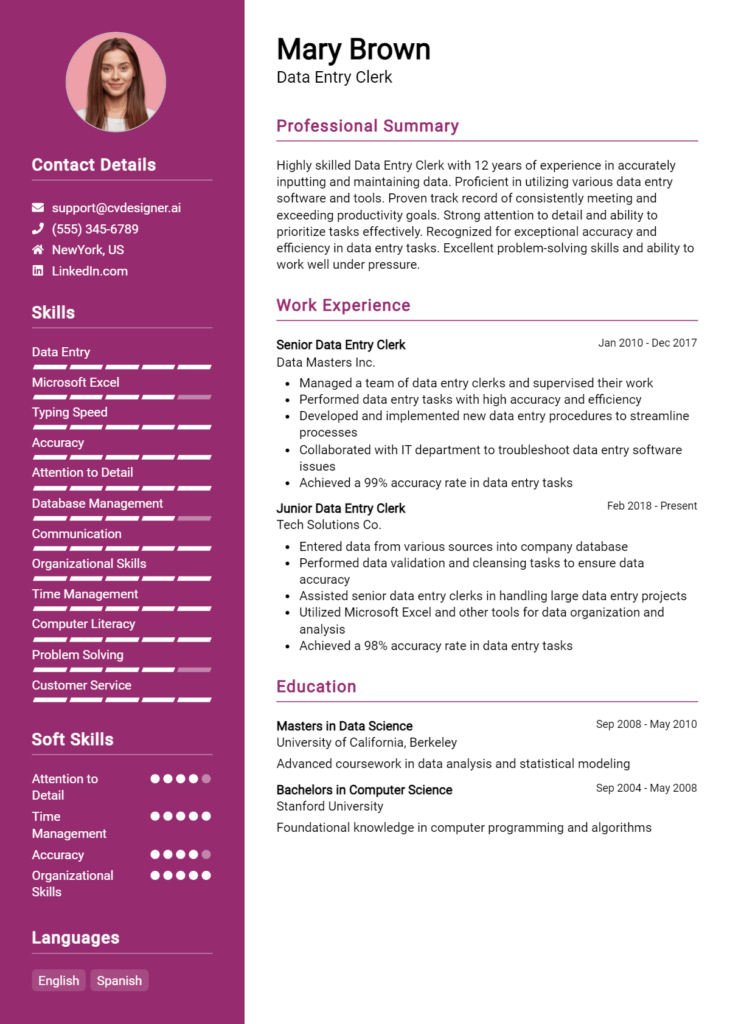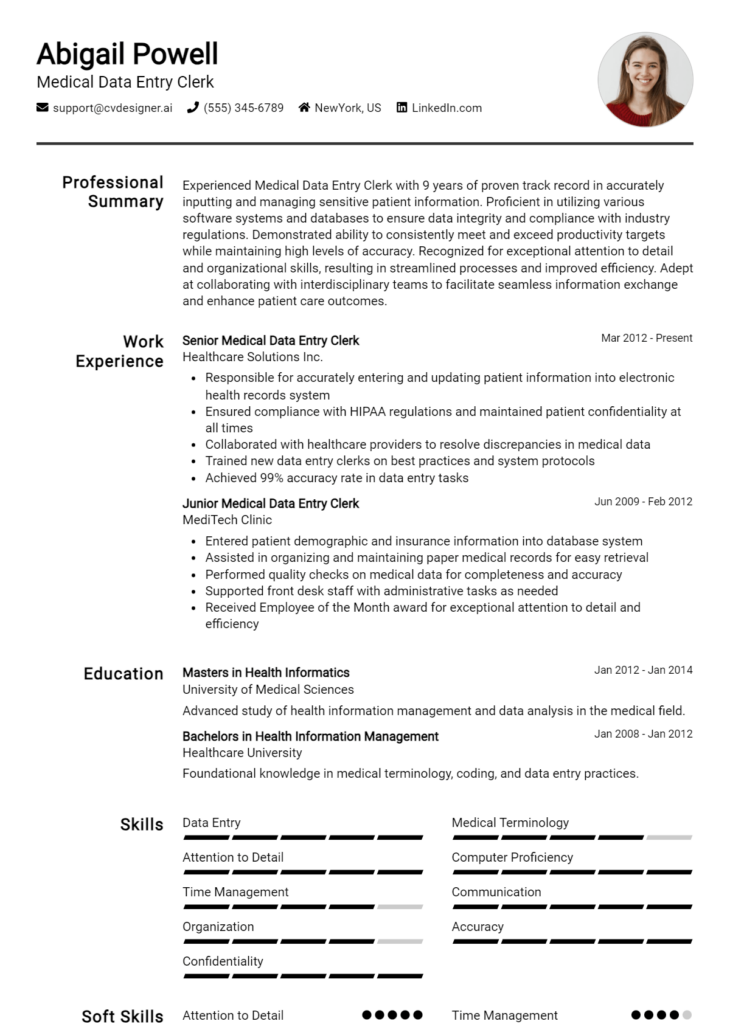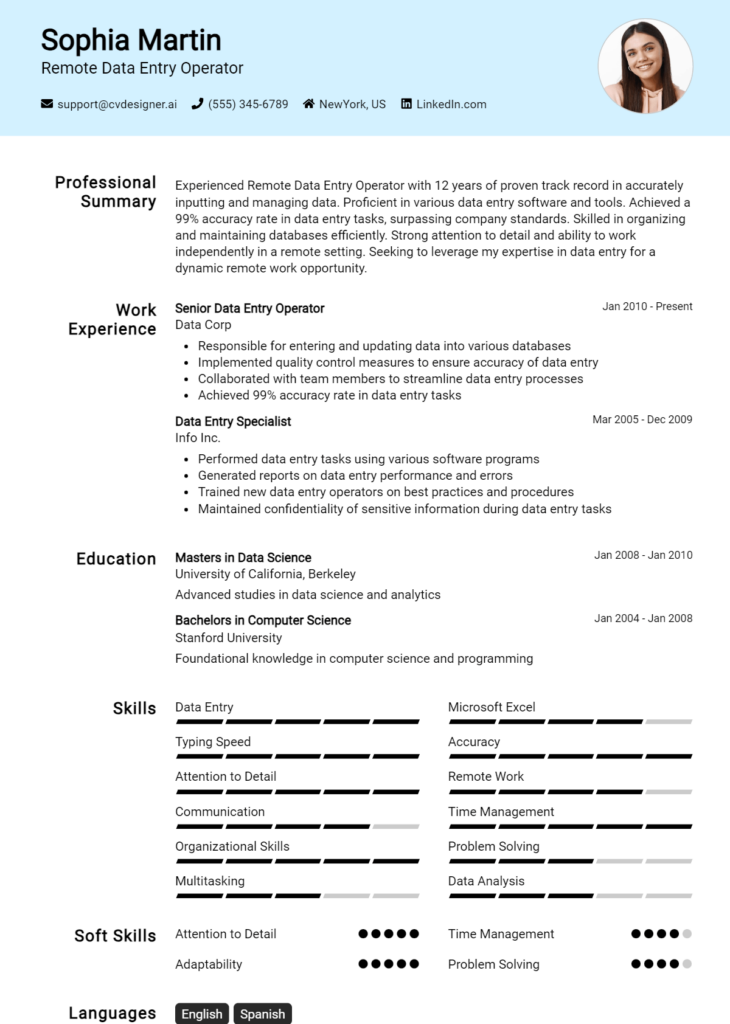Medical Records Clerk Core Responsibilities
A Medical Records Clerk plays a vital role in managing patient information and ensuring the smooth flow of data between healthcare departments. Key responsibilities include maintaining accurate patient records, organizing electronic health records (EHR), and ensuring compliance with privacy regulations. Essential skills encompass technical proficiency with EHR systems, operational efficiency, and strong problem-solving capabilities. These abilities contribute significantly to the organization's overall goals by enabling seamless communication and data integrity, which can be effectively highlighted in a well-structured resume.
Common Responsibilities Listed on Medical Records Clerk Resume
- Maintain and organize patient medical records
- Ensure accuracy and completeness of documentation
- Process patient admissions, discharges, and transfers
- Manage electronic health record (EHR) systems
- Ensure compliance with HIPAA regulations
- Coordinate with healthcare providers for record updates
- Assist in data retrieval for auditing and quality assurance
- Respond to requests for patient information and records
- Train new staff on record-keeping procedures
- Maintain confidentiality of sensitive information
- Generate reports as needed for administrative purposes
- Support billing and coding processes through accurate documentation
High-Level Resume Tips for Medical Records Clerk Professionals
In the competitive field of healthcare administration, a well-crafted resume is crucial for Medical Records Clerk professionals. Your resume is often the first impression you make on potential employers, serving as your personal marketing tool to showcase your skills, qualifications, and achievements. It should not only detail your work history but also reflect your ability to manage sensitive information accurately and efficiently. In this guide, you will find practical and actionable resume tips specifically designed for Medical Records Clerk professionals, helping you stand out in a crowded job market.
Top Resume Tips for Medical Records Clerk Professionals
- Tailor your resume to align with the specific job description, using keywords and phrases that mirror the employer's requirements.
- Highlight relevant experience in medical records management, including any internships or volunteer work in healthcare settings.
- Quantify your achievements where possible, such as the number of records managed or accuracy rates, to demonstrate your effectiveness.
- Showcase industry-specific skills like proficiency in electronic health record (EHR) systems, data entry accuracy, and medical terminology knowledge.
- Include certifications relevant to the field, such as Registered Health Information Technician (RHIT) or Certified Medical Administrative Assistant (CMAA).
- Utilize a clean, professional format that is easy to read, ensuring that important information stands out to hiring managers.
- Incorporate a strong summary statement at the top of your resume that highlights your key qualifications and career goals.
- Emphasize your attention to detail and organizational skills, as these are critical attributes for a Medical Records Clerk.
- List any additional skills that may be relevant, such as customer service experience or knowledge of privacy regulations (e.g., HIPAA compliance).
By implementing these tips, you can significantly enhance your resume and increase your chances of landing a job as a Medical Records Clerk. A targeted and polished resume will not only highlight your qualifications but also demonstrate your commitment to the profession and your potential contribution to the healthcare team.
Why Resume Headlines & Titles are Important for Medical Records Clerk
In the competitive field of healthcare, a Medical Records Clerk plays a crucial role in maintaining accurate and organized patient records, ensuring compliance with regulations, and facilitating smooth operations within medical facilities. To stand out in the job application process, a well-crafted resume headline or title is essential. A strong headline can immediately capture the attention of hiring managers, offering a concise summary of a candidate's key qualifications in just a few impactful words. It should be relevant to the position and reflect the unique skills and experiences that make the applicant a suitable choice for the role.
Best Practices for Crafting Resume Headlines for Medical Records Clerk
- Keep it concise: Aim for a headline that is brief yet informative, ideally 5-10 words.
- Be role-specific: Tailor your headline to reflect the Medical Records Clerk position you are applying for.
- Highlight key skills: Include relevant skills or certifications that make you a standout candidate.
- Use action-oriented language: Start with strong verbs or phrases that convey your expertise and contributions.
- Reflect your experience level: Indicate whether you are an entry-level candidate, mid-career professional, or seasoned expert.
- Avoid jargon: Use clear, straightforward language that is easily understood by hiring managers.
- Incorporate numbers when possible: Quantify achievements or qualifications to add credibility to your headline.
- Stay true to your personal brand: Ensure that your headline aligns with your overall professional image and goals.
Example Resume Headlines for Medical Records Clerk
Strong Resume Headlines
Detail-Oriented Medical Records Clerk with 5+ Years of Experience in Health Information Management
Certified Medical Coder and Records Specialist Committed to Accuracy and Compliance
Experienced Medical Records Clerk Skilled in Electronic Health Record Systems
Proficient in Patient Data Management and Medical Record Organization
Weak Resume Headlines
Medical Records Clerk Looking for Job
Hardworking Individual Seeking Employment
Entry-Level Position in Medical Records
The strong headlines are effective because they clearly convey the candidate's relevant skills, experience, and certifications, making an immediate impression on hiring managers. These headlines are specific, targeted, and highlight what the candidate brings to the table. Conversely, the weak headlines fail to impress due to their vagueness and lack of specificity. They do not provide any concrete information about the candidate's qualifications or career goals, making it difficult for hiring managers to see the potential value in the applicant.
Writing an Exceptional Medical Records Clerk Resume Summary
A well-crafted resume summary is crucial for a Medical Records Clerk as it serves as the first impression for hiring managers. This brief yet impactful statement encapsulates the candidate's key skills, relevant experience, and notable accomplishments, allowing potential employers to quickly gauge their qualifications for the role. A strong summary should be concise and directly tailored to the specific job the candidate is applying for, highlighting their ability to manage patient information, adhere to regulations, and contribute to the efficiency of healthcare operations.
Best Practices for Writing a Medical Records Clerk Resume Summary
- Quantify Achievements: Use numbers and statistics to demonstrate your impact in previous roles.
- Focus on Relevant Skills: Highlight skills that are directly applicable to the job description, such as data management, attention to detail, and knowledge of healthcare regulations.
- Tailor the Summary: Customize your summary for each job application to reflect the specific requirements and responsibilities outlined in the job description.
- Use Action Verbs: Start sentences with strong action verbs to convey confidence and proactivity.
- Keep It Concise: Aim for 2-4 sentences that capture the essence of your professional background without overwhelming the reader.
- Include Keywords: Incorporate industry-specific keywords that align with the role to pass through applicant tracking systems.
- Showcase Soft Skills: Highlight interpersonal skills that are vital in healthcare, such as communication and teamwork.
- Reflect Professional Growth: Mention any advancements or progress in your career that showcases your development in the field.
Example Medical Records Clerk Resume Summaries
Strong Resume Summaries
Detail-oriented Medical Records Clerk with over 5 years of experience managing patient records for a busy urban hospital. Streamlined data entry processes, resulting in a 30% decrease in record retrieval time and improved patient satisfaction scores.
Dedicated Medical Records Clerk skilled in maintaining accurate patient information and ensuring compliance with HIPAA regulations. Successfully implemented an electronic filing system that increased data retrieval efficiency by 40% while reducing paper waste.
Experienced Medical Records Clerk with a proven track record of managing over 10,000 patient files and ensuring timely processing. Recognized for exceptional attention to detail, resulting in a 98% accuracy rate in medical documentation.
Weak Resume Summaries
I am a Medical Records Clerk looking for a job. I have experience in handling records and like to work with people.
Motivated individual seeking a Medical Records Clerk position. I have some experience in medical environments and am interested in healthcare.
The examples provided illustrate a clear distinction between strong and weak resume summaries. Strong summaries effectively showcase relevant skills, quantified achievements, and specific contributions to previous roles, making them impactful and tailored to the job. In contrast, weak summaries lack detail, specificity, and measurable outcomes, which can fail to capture the attention of hiring managers or convey the candidate's true capabilities.
Work Experience Section for Medical Records Clerk Resume
The work experience section of a Medical Records Clerk resume is a critical component that highlights a candidate's relevant skills and accomplishments in the healthcare industry. This section not only demonstrates the candidate's technical proficiency in managing patient records and utilizing electronic health record (EHR) systems but also showcases their capacity to work collaboratively within a team environment. By detailing specific achievements and quantifying results, candidates can effectively align their experience with industry standards, presenting themselves as qualified professionals capable of delivering high-quality services in a fast-paced medical setting.
Best Practices for Medical Records Clerk Work Experience
- Focus on specific technical skills related to medical records management, such as familiarity with EHR software and data entry accuracy.
- Quantify achievements where possible, such as the number of records processed or reductions in retrieval times.
- Highlight experiences that demonstrate collaboration with healthcare professionals, ensuring seamless information transfer.
- Include examples of process improvements or efficiencies implemented in previous roles.
- Use action verbs to convey a sense of leadership and initiative in managing tasks and teams.
- Tailor the work experience section to match job descriptions, emphasizing relevant experiences that align with the role being applied for.
- Showcase any additional certifications or training that enhance your qualifications as a Medical Records Clerk.
- Maintain a clear and organized format for easy readability, making it simple for hiring managers to assess qualifications quickly.
Example Work Experiences for Medical Records Clerk
Strong Experiences
- Successfully implemented a new electronic health record system that increased data retrieval efficiency by 30%, resulting in improved patient care.
- Managed a team of 5 clerks to streamline the data entry process, reducing errors by 15% and speeding up patient record updates.
- Trained 10 new staff members on best practices for medical record maintenance, enhancing overall team performance and compliance with HIPAA regulations.
- Conducted regular audits of medical records, achieving a 95% accuracy rate and ensuring adherence to regulatory standards.
Weak Experiences
- Helped with filing and organizing medical records.
- Assisted in the office with various tasks related to medical records.
- Performed data entry for patient records occasionally.
- Worked as part of a team in the medical records department.
The examples provided above illustrate the distinction between strong and weak experiences in a Medical Records Clerk resume. Strong experiences are characterized by specific, quantifiable accomplishments and demonstrate the candidate’s technical skills, leadership, and collaboration within a team. In contrast, weak experiences lack detail and do not convey the candidate's impact or contributions effectively, making them less appealing to potential employers.
Education and Certifications Section for Medical Records Clerk Resume
The education and certifications section of a Medical Records Clerk resume is crucial for showcasing a candidate's academic background and commitment to professional development. This section serves as a reflection of the candidate's qualifications and expertise, emphasizing their understanding of medical terminology, healthcare regulations, and record management systems. By including relevant coursework, industry-recognized certifications, and specialized training, candidates can significantly enhance their credibility and demonstrate their alignment with the specific needs of the job role, ultimately making a stronger case for their candidacy.
Best Practices for Medical Records Clerk Education and Certifications
- Include relevant degrees such as an Associate's or Bachelor's in Health Information Management or a related field.
- List certifications such as Registered Health Information Technician (RHIT) or Certified Coding Associate (CCA) to highlight industry recognition.
- Provide details about relevant coursework such as medical terminology, health data management, and healthcare compliance.
- Highlight any specialized training programs or workshops attended that pertain to medical records management.
- Use clear and concise language to describe educational achievements and certifications.
- Ensure that the information is up-to-date, reflecting current qualifications and certifications.
- Tailor the section to align with the specific job description and employer needs.
- Consider formatting certifications and education in a way that emphasizes their relevance, such as using bold text or bullet points.
Example Education and Certifications for Medical Records Clerk
Strong Examples
- Associate of Applied Science in Health Information Technology, XYZ Community College, 2021
- Registered Health Information Technician (RHIT), National Association for Health Professionals, 2022
- Coursework in Medical Terminology and Health Data Management, ABC University, 2020
- Certified Electronic Health Records Specialist (CEHRS), 2023
Weak Examples
- Bachelor's in Philosophy, ABC University, 2019
- Certification in Microsoft Office (2008)
- High School Diploma, Anytown High School, 2015
- Outdated Certification in Medical Billing (2010)
The examples listed as strong are relevant and directly aligned with the qualifications necessary for a Medical Records Clerk. They reflect pertinent degrees, recognized certifications, and coursework that demonstrate an understanding of the field. Conversely, the weak examples illustrate educational qualifications and certifications that do not pertain to the role or are outdated, which could detract from the candidate's credibility and relevance in a competitive job market.
Top Skills & Keywords for Medical Records Clerk Resume
A well-crafted resume for a Medical Records Clerk is essential in showcasing the specific skills that align with the demands of this role. Skills not only highlight your qualifications but also demonstrate your ability to manage, organize, and protect sensitive patient information effectively. Potential employers seek candidates who possess a blend of technical knowledge and interpersonal abilities to ensure a smooth workflow within healthcare settings. By emphasizing both soft and hard skills in your resume, you can present yourself as a well-rounded candidate ready to contribute to the efficiency and accuracy of medical record management.
Top Hard & Soft Skills for Medical Records Clerk
Soft Skills
- Attention to Detail
- Organizational Skills
- Communication Skills
- Time Management
- Problem-Solving Abilities
- Team Collaboration
- Adaptability
- Interpersonal Skills
- Customer Service Orientation
- Critical Thinking
Hard Skills
- Proficiency in Electronic Health Records (EHR) Systems
- Medical Terminology Knowledge
- Data Entry Skills
- Record Management Systems
- Understanding of HIPAA Regulations
- Microsoft Office Suite Proficiency
- Medical Coding Basics
- Filing and Retrieval Systems
- Knowledge of Insurance Verification Processes
- Basic Computer Skills
By combining these skills with relevant work experience, candidates can create compelling resumes that stand out in the competitive healthcare job market.
Stand Out with a Winning Medical Records Clerk Cover Letter
Dear [Hiring Manager's Name],
I am writing to express my interest in the Medical Records Clerk position at [Company Name] as advertised on [Where You Found the Job Posting]. With a solid background in medical record management and a keen attention to detail, I am confident in my ability to contribute effectively to your healthcare team and ensure the accurate handling of patient information.
In my previous role at [Previous Employer], I successfully managed a high volume of medical records while ensuring compliance with HIPAA regulations and organizational policies. My experience includes proficiently entering and retrieving patient data, maintaining confidentiality, and assisting healthcare professionals in accessing the information they need for optimal patient care. I have developed strong organizational skills and a meticulous approach to record-keeping, which has allowed me to improve data accuracy and streamline workflows.
Moreover, I am proficient in using various electronic health record (EHR) systems and have a strong understanding of medical terminology. This technical expertise, coupled with my ability to work collaboratively with staff across departments, positions me well to support the mission of [Company Name]. I am enthusiastic about the opportunity to contribute to an organization that prioritizes patient care and leverages technology to enhance operational efficiency.
Thank you for considering my application. I look forward to the possibility of discussing how my skills and experiences align with the needs of your team. I am excited about the opportunity to bring my passion for healthcare and commitment to excellence to [Company Name].
Sincerely,
[Your Name]
[Your Contact Information]
Common Mistakes to Avoid in a Medical Records Clerk Resume
When creating a resume for a Medical Records Clerk position, it’s crucial to present your qualifications and skills effectively. However, many candidates make common mistakes that can hinder their chances of landing an interview. By avoiding these pitfalls, you can enhance the clarity and professionalism of your resume, making it more appealing to potential employers. Below are some frequent errors to watch out for:
Neglecting to Tailor the Resume: Failing to customize your resume for the specific job you are applying for can make it appear generic and unengaging. Tailoring your resume to reflect the job description shows that you have taken the time to understand the role.
Overloading with Irrelevant Information: Including unrelated work experience or skills can distract from your qualifications for the medical records position. Focus on relevant experience that aligns with the job requirements.
Using Jargon Without Explanation: While medical terminology is important, using excessive jargon without context can confuse hiring managers. Ensure that your skills and experiences are communicated clearly and succinctly.
Poor Formatting: A cluttered or inconsistent format can make your resume difficult to read. Use clear headings, bullet points, and a professional font to enhance readability.
Ignoring Quantifiable Achievements: Simply listing job duties without highlighting your accomplishments can make your resume less impactful. Use numbers and specific examples to demonstrate your contributions and successes in previous roles.
Lack of Attention to Detail: Spelling and grammatical errors can create a negative impression. Always proofread your resume multiple times or ask someone else to review it for you.
Vague Job Descriptions: Using generic descriptions for past job roles can fail to communicate your actual responsibilities and skills. Be specific about your tasks and the software or systems you used.
Failing to Include Relevant Certifications: Not mentioning relevant certifications, such as HIPAA compliance or medical coding credentials, can overlook important qualifications that set you apart from other candidates. Be sure to include any certifications that enhance your professional profile.
Conclusion
As a Medical Records Clerk, you play a crucial role in managing patient information and ensuring that medical records are accurate and secure. Key responsibilities include organizing and maintaining patient files, updating records with new information, and ensuring compliance with healthcare regulations. Attention to detail, strong organizational skills, and proficiency with medical software systems are essential for success in this role.
To enhance your chances of landing a Medical Records Clerk position, it’s vital to present a polished and professional resume. Take the time to review and update your resume to reflect your skills, experience, and qualifications effectively.
Utilize available resources to craft a standout application. Explore helpful resume templates to get started on the right foot. If you're looking for a more guided approach, try the resume builder to create a tailored resume that showcases your strengths. Additionally, consider reviewing resume examples for inspiration and insights on what hiring managers look for. Don’t forget to complement your resume with a compelling cover letter; check out our cover letter templates to make a great first impression.
Take action today—review your Medical Records Clerk resume and leverage these tools to enhance your job application process!

